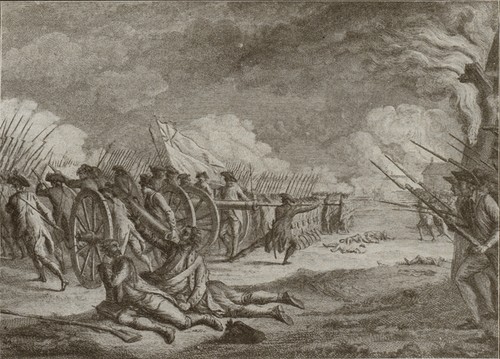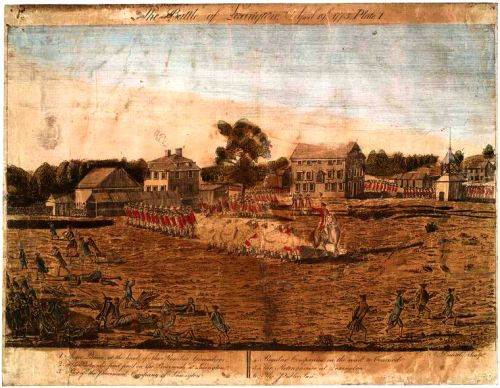Paul Revere’s ride preceded the Battle of Lexington. As the British marched from Boston to confiscate munitions at Concord, the town of Lexington, Massachusetts would see the first shots and battle of the Revolutionary War.Listen my children and you shall hear
Of the midnight ride of Paul Revere
On the 18th of April in Seventy-Five
Hardly a man is now alive
Who remembers that famous day and year
Henry Wadsworth Longfellow wrote of one of the many events that led to the American Revolution. Not long after Paul Revere, William Dawes, and Samuel Prescott—the sons of liberty—sounded the alarm, the minutemen of Middlesex prepared for battle.

A very overstated drawing of the Battle of Lexington from an 1815 German history book
Paul Revere and the sons of liberty warned the minutemen that the British would be coming “by sea”—though this was literally “by water,” meaning they were crossing the Charleston river—seeking to crush patriot resistance before it started.
“The British are coming!”
Paul Revere did not ride through the countryside shouting “The British are coming.”
In fact, he did not shout anything.
There were plenty of loyalists to the crown among the colonists. Secrecy was necessary. Paul Revere’s job, along with William Dawes, was to warn certain predetermined men so that the patriot militia could prepare for the British troops marching to Concord.
Why the British Were Coming
The Battle of Lexington happened because General Gage, a loyalist to the King, had received secret instructions from Dartmouth to take the patriots’ weapons, lest they riot against them.
The British had to march through Lexington in order to get to Concord and take the military artillery. They were planning on marching only to Concord, but since they had met up with patriots ready to fight in Lexington, battle resulted.
How the patriot leaders got word of this was guessed to have come from Margaret Kemble Gage. She was General Gage’s wife and supported the patriot’s work more than she did her husband’s. She was born in New Jersey and it is rumored that she was a good friend of Joseph Warren, one of the patriot leaders.
Joseph Warren is said to have been the person to warn Paul Revere of the British coming to Boston.
Battle of Lexington: Events
Early in the morning, before daybreak, on April 19, 1775, the Battle of Lexington began. The patriots’ leader, Captain John Parker, was courageous and fought with his men until the end.
When Captain Parker assembled his small army near Lexington, he realized they were too small to take on the British force.
“Stand your ground. Do not fire unless you are fired upon, but if they mean war, let it begin here,” he encouraged his men.
A British lieutenant rode ahead of his ranks, waving his sword in the air and shouting to the patriots, “Lay down your arms, you damned rebels, or you are all dead men!”
Both Parker and the British officer gave their men orders not to shoot. Captain Parker even ordered the men to disband to ease the commotion; however, his men could not hear him well due to the commotion and his encounter with tuberculosis earlier. Few dispersed, and none of them laid down their weapons.
At that point, an unknown shot came from someone in the ranks or hiding behind the walls and trees. The British soldiers, probably without orders, then opened fire on the Americans. Parker’s brother Jonas was run through with a bayonet in the skirmish.
The minutemen quickly fled.
Eight men died, all colonists, during the Battle of Lexington, and another ten were injured.

A more accurate representation of the Battle of Lexington by Amos Doolittle in 1775
The Shot Heard ‘Round the World
According to many, there was a “shot heard ’round the world” that signified the beginning of the Revolutionary War.
It is called that because it was a loud statement from the people of young America that they would not put up with Britain or the King’s rule. They wanted to be a free country and they would fight for it, which proved to be necessary in the end.
There are many opinions that have been put out about what exactly that statement was referring to at the time. The most likely idea would be that originally the phrase referred to <a href=”battle-of-concord.html”>the Battle of Concord</a> and not the Battle of Lexington. Once the patriots attained victory at the Battle of Concord, they saw that they could get their chance to become an independent country.
Ralph Waldo Emerson first used the term in his “Concord Hymn” in 1837 …
By the rude bridge that arched the flood
Their flag to April’s breeze unfurled
Here once the embattled farmers stood
And fired the shot heard ’round the world
The Battle of Lexington is considered part of the start of the Revolutionary War. It was a very important battle to the early Americans so that they would finally win their freedom from Britain.


